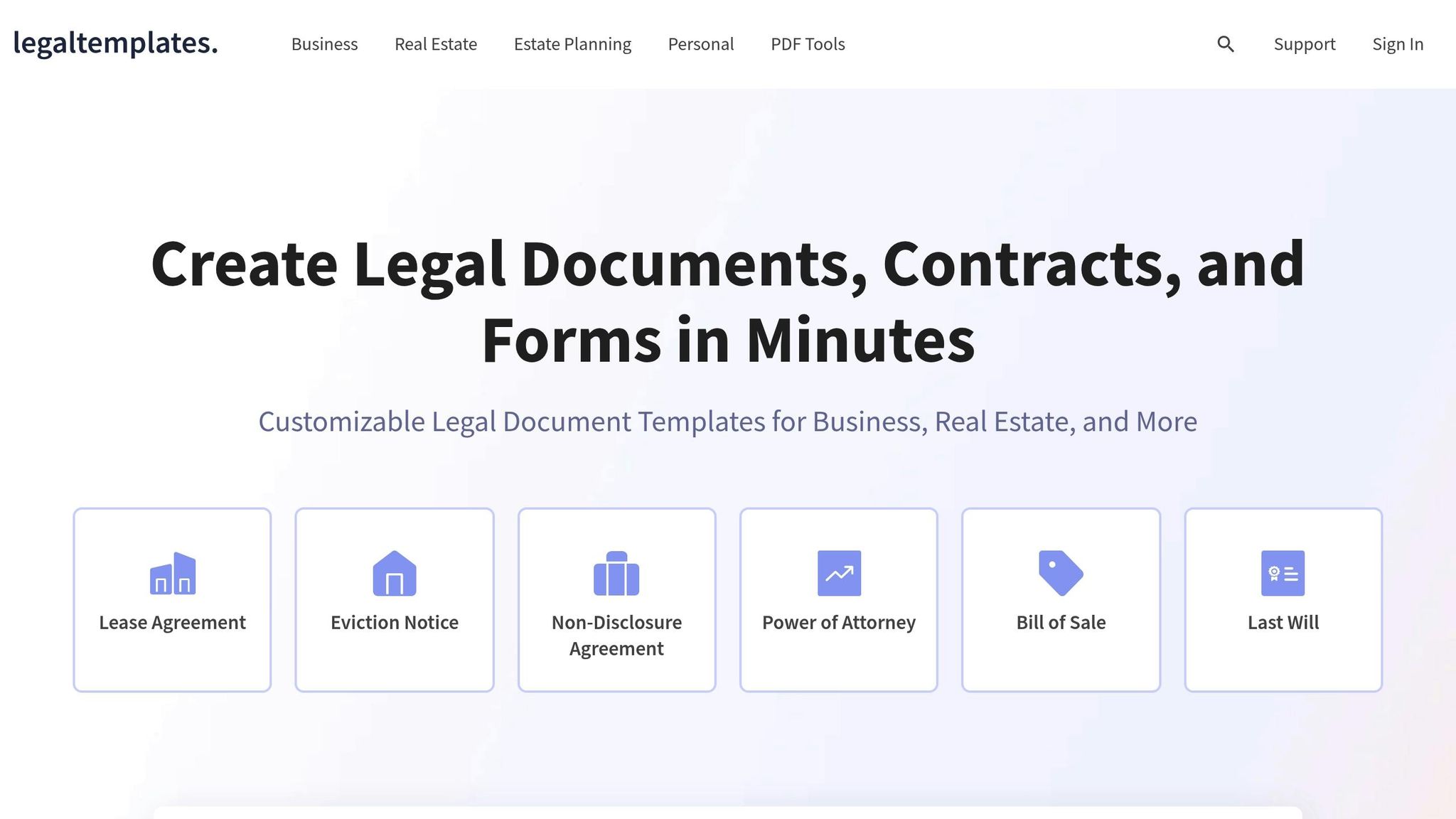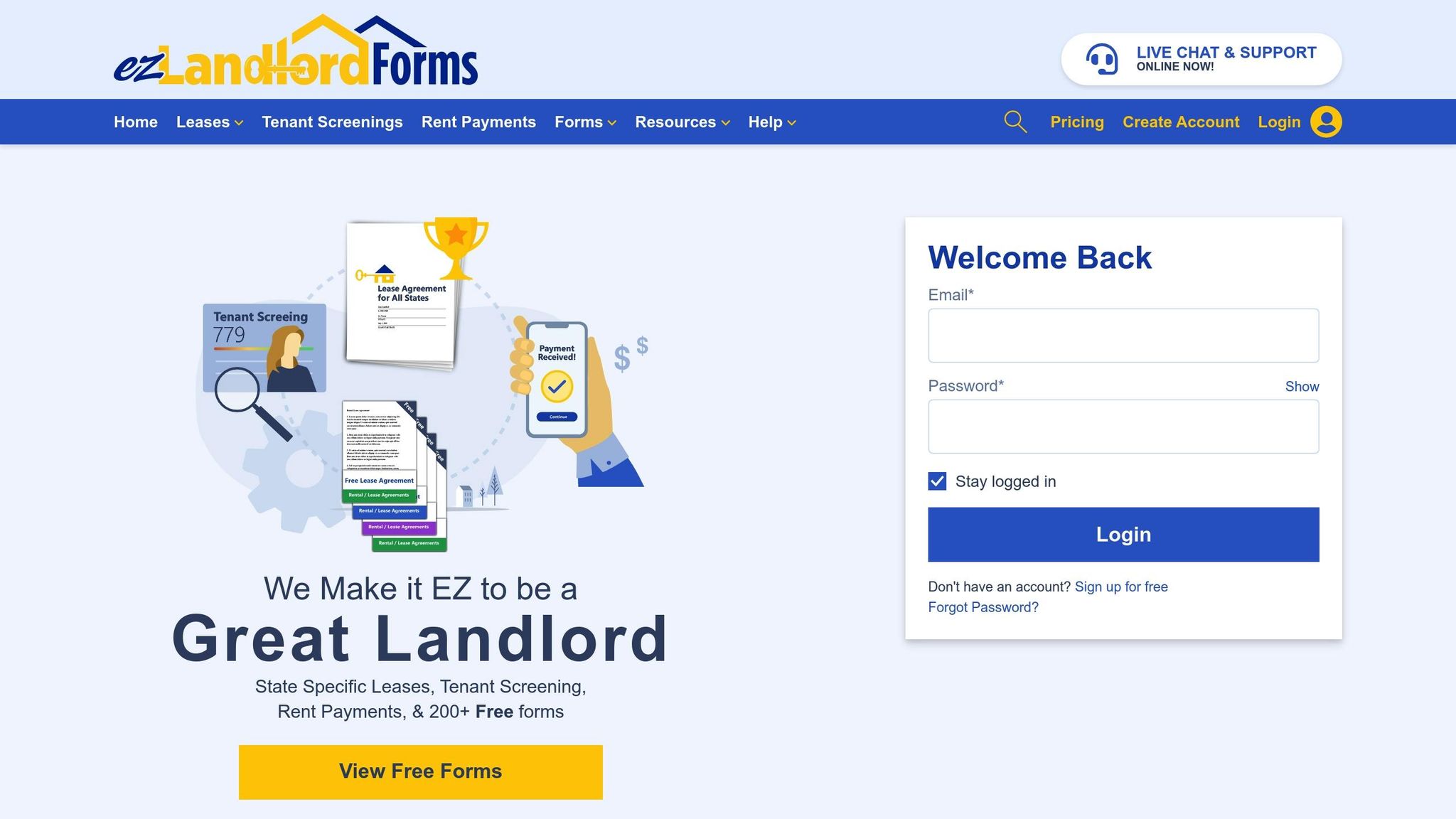Need a property management contract? This guide offers 10 free templates tailored to help property owners and managers avoid disputes and stay legally compliant. With the U.S. property management market surpassing $101 billion in 2023, having a clear, lawyer-reviewed agreement is more important than ever. These templates cover residential, commercial, and vacation rentals, ensuring you can manage fees, responsibilities, and termination terms effectively.
Key Takeaways:
- Core Elements: Include party details, services, fees, termination clauses, and insurance.
- Customization: Templates can be adjusted for state-specific laws and unique property needs.
- Top Picks:
- Small Business Legal Documents: Best for broad customization and legal compliance.
- Lodgify: Ideal for short-term rentals like Airbnb.
- LegalTemplates.net: Strong legal protection with liability and termination clauses.
Quick Tip: Always consult a lawyer to ensure your contract meets local regulations. Keep reading for a breakdown of each template and how to choose the right one for your property.
Ohio Property Management Agreement EXPLAINED
What to Look for in Property Management Contract Templates
When choosing a property management contract template, it’s crucial to ensure it’s legally reliable, thorough, and flexible enough to align with state-specific regulations.
Core Components of Property Management Contracts
A well-structured property management contract should include these essential elements:
- Party identification and property details: The contract should clearly list the full legal names, addresses, and contact information of all involved parties. Additionally, it must provide a detailed description of the property, including its address, type, and any specific units covered.
- Scope of services: This section outlines the manager’s responsibilities, which might include tenant screening, rent collection, property maintenance, inspections, and marketing vacant units. A clear breakdown of duties helps avoid misunderstandings later.
- Fee structure and payment terms: To prevent disputes, the template should define management fees (often a percentage of rental income), charges for additional services (like tenant placement or maintenance), payment schedules, and any late fees or reimbursements for expenses.
- Termination clauses: These clauses set out the procedures for ending the agreement, including notice periods, conditions for termination, and how responsibilities like transferring tenant records or security deposits will be handled.
- Liability and insurance provisions: Addressing risk management is key. The contract should specify insurance requirements, liability limits, and how issues like property damage, tenant injuries, or legal disputes will be managed.
Finally, the template should be adaptable enough to meet changing state regulations, ensuring long-term compliance.
Customization and Legal Compliance
Property management laws differ across the United States, so selecting a template that can be tailored to meet state-specific requirements is essential.
- State-specific regulatory compliance: Laws governing licensing, security deposits, evictions, and leases vary by state. For example, California, Texas, and Florida each have unique requirements enforced by their respective regulatory bodies. A good template should allow for adjustments to meet these diverse standards.
- Lawyer-reviewed content: Templates that have been reviewed by legal professionals provide an added layer of assurance. While these templates are a strong foundation, consulting a lawyer to tailor the contract to your unique needs is always a wise step.
The best templates strike a balance between comprehensive legal coverage and easy customization, helping property managers and owners create agreements that protect their interests while staying compliant with all relevant laws.
10 Free Property Management Contract Templates
These templates cater to a range of property management needs, offering features tailored to specific scenarios. Whether you’re managing residential, commercial, or short-term rental properties, there’s likely a template here that fits your requirements.
Small Business Legal Documents Property Management Template

Small Business Legal Documents offers a contract template from a library of over 2,000 documents. Reviewed by qualified lawyers, this template includes a customization tool that allows you to tailor it to your specific needs.
With a jurisdiction selection feature, the template ensures compliance with state laws. Key elements like service scope, fee structures, and termination clauses can be adjusted to suit your property management goals. It works for both residential and commercial properties, making it a versatile option. Plus, you can request additional clauses to address unique business needs as they arise.
Airbnb Property Management Contract (Lodgify)

Lodgify’s template is designed specifically for short-term rental management, making it a great choice for Airbnb hosts and vacation rental owners. It covers essential tasks like guest turnover, cleaning schedules, and booking coordination.
The template also includes provisions for marketing vacant units across platforms and managing frequent tenant changes. Maintenance responsibilities, such as amenity upkeep and quick responses to guest issues, are also addressed. For property owners, the template offers flexibility in choosing between flat fees or percentage-based fees, helping to align management costs with booking performance.
Signaturely Property Management Agreement Template

Signaturely’s template streamlines contract execution with electronic signature integration. This feature eliminates the hassle of collecting physical signatures and automatically records the signing process, which can be helpful for legal compliance and record-keeping.
While it includes standard property management provisions, the focus is on making digital contract processing quick and efficient.
RentPost Property Management Agreement Contract

RentPost’s template is tailored for residential property management, emphasizing smooth landlord-tenant relationships. It includes detailed guidelines for rent collection, tenant screening, and maintenance request handling.
The template also addresses security deposit management, lease enforcement, tenant disputes, and property inspections. Its focus on tenant relationship management and clear division of responsibilities makes it an excellent choice for residential property managers.
Contractbook Property Management Agreement Template

Contractbook offers a digital-first solution with online editing and storage features. Users can define property manager responsibilities directly within the platform and collaborate in real-time with other stakeholders during the customization process.
Completed contracts are stored in the cloud, making them easily accessible and organized – an invaluable feature for property managers juggling multiple agreements simultaneously.
LegalTemplates.net Property Management Agreement

LegalTemplates.net provides a lawyer-reviewed template designed to comply with U.S. legal standards. It ensures adherence to federal and state laws, including fair housing and anti-discrimination regulations.
This template includes comprehensive liability and insurance sections, along with detailed termination procedures and dispute resolution mechanisms. It’s ideal for property managers seeking robust legal protection.
Free Property Management Agreement Template by LawDepot

LawDepot’s template caters to both residential and commercial property types. It features separate sections for each category, allowing for easy customization.
The template covers fee structures, including management, leasing, and maintenance fees. It also includes provisions for property improvements and capital expenditures, which are especially relevant for commercial properties. Its flexibility makes it a strong choice for property managers handling mixed portfolios.
Rocket Lawyer Property Management Contract

Rocket Lawyer’s template is designed for small business owners who need legal compliance without unnecessary complexity. With guided customization, users can easily understand and modify each section.
The template includes key elements like service definitions, payment terms, and liability provisions, all presented in straightforward language. This makes it a user-friendly option for property owners new to professional management contracts.
EZLandlordForms Property Management Agreement

EZLandlordForms focuses on rent collection, property maintenance, and tenant communication. It provides detailed procedures for addressing common landlord challenges.
The template outlines maintenance and repair responsibilities, including emergency protocols and routine upkeep schedules. It also covers property inspections and tenant move-in/move-out processes, making it ideal for landlords who want to stay actively involved in their properties.
Avvo Property Management Contract Template
Avvo’s template combines lawyer-reviewed content with user-friendly editing tools. It includes explanatory notes to help users understand the legal implications of various provisions.
The template covers standard property management tasks while allowing for customization to meet specific property needs. It’s a solid choice for owners who want legal reliability paired with practical flexibility.
These templates provide property managers with tools to ensure legal compliance and operational efficiency across a variety of rental situations. From residential to short-term rentals, there’s a template here to suit almost any property management scenario.
Template Features Comparison
Choosing the right template for your property management needs depends on the type of property, your management approach, and specific requirements. Each template has its own strengths and limitations, making it suitable for different scenarios.
The Small Business Legal Documents template is a standout choice for its extensive customization options and legal review. With over 2,000 lawyer-reviewed templates, it provides a solid legal foundation for both residential and commercial properties. Its jurisdiction selection feature ensures compliance with state-specific laws, while its customization tools allow you to tailor contracts to your business needs.
For short-term rental management, Lodgiy’s Airbnb-focused template is a great fit. It addresses key challenges like guest turnover, cleaning schedules, and booking coordination. Additionally, it offers flexible fee structures, including flat fees and percentage-based options, making it ideal for vacation rental hosts.
Digital-first solutions like Signaturely and Contractbook focus on workflow efficiency. Signaturely simplifies contract execution with electronic signature integration, while Contractbook offers cloud storage and real-time collaboration – perfect for property managers juggling multiple agreements. These tools emphasize streamlined processes, a topic explored further in the customization guide.
Templates from LegalTemplates.net and Avvo emphasize legal compliance, offering strong liability and termination clauses. These features are essential for managers who prioritize a solid legal framework. On the other hand, residential-focused templates like RentPost cater to tenant relationship management, rent collection, and maintenance requests, providing clear guidelines for handling security deposits and enforcing leases.
The table below provides a quick comparison of key features across popular templates:
Feature Comparison Table
| Template | Property Type | Key Strengths | Legal Review | Customization | Best For |
|---|---|---|---|---|---|
| Small Business Legal Documents | Residential/Commercial | Lawyer-reviewed, jurisdiction selection, extensive customization | Yes | High | Comprehensive legal protection |
| Lodgiy (Airbnb) | Short-term rentals | Guest turnover management, flexible fee structures | No | Medium | Vacation rentals, Airbnb hosts |
| Signaturely | General | Electronic signatures, digital workflow | No | Low | Quick contract execution |
| RentPost | Residential | Tenant relations, rent collection focus | No | Medium | Residential property managers |
| Contractbook | General | Cloud storage, real-time collaboration | No | High | Multiple property portfolios |
| LegalTemplates.net | General | Legal compliance, liability protection | Yes | Medium | Legal protection priority |
| LawDepot | Residential/Commercial | Diverse portfolio support, flexible fee structures | No | High | Various property types |
| Rocket Lawyer | General | User-friendly, guided customization | Yes | Medium | New property managers |
| EZLandlordForms | Residential | Maintenance focus, inspection procedures | No | Medium | Hands-on landlords |
| Avvo | General | Lawyer-reviewed, guiding notes | Yes | Medium | Reliable legal support with flexibility |
Templates with lawyer review – like those from Small Business Legal Documents, LegalTemplates.net, Rocket Lawyer, and Avvo – offer the strongest legal foundations. These ensure compliance with federal and state laws, including fair housing and anti-discrimination standards, which is particularly important given that nearly 50% of U.S. rental property owners rely on property management companies.
Customization levels vary significantly. Templates like Small Business Legal Documents, Contractbook, and LawDepot offer extensive options, making them suitable for complex property management needs. In contrast, templates with lower customization are better suited for straightforward rental arrangements.
Fee structure flexibility is another key factor. While most templates adhere to the standard fee range of 8–12%, Lodgiy stands out with its flexible flat fee and percentage-based options, offering greater adaptability for short-term rental hosts.
These comparisons provide a foundation for selecting the right template to meet your needs. Whether prioritizing legal protection, operational efficiency, or customization, the best choice depends on your specific property management requirements. Templates with lawyer review offer stronger legal safeguards, while specialized options like Lodgiy address unique challenges in niche markets. Balancing these factors ensures your contract is both compliant and tailored to your business.
sbb-itb-a688917
How to Use and Customize Property Management Contract Templates
When it comes to creating a property management contract in the U.S., customization is key to ensuring all legal bases are covered. By following the steps below, you can tailor your contract to meet the specific needs of your property and management arrangement.
Step-by-Step Guide to Customizing Templates
Start by identifying your needs. Different property types and management scopes demand different approaches. For example, managing a single-family home is not the same as overseeing a multi-family complex, commercial property, or vacation rental. Each has unique requirements, such as clauses for guest turnover or cleaning schedules for short-term rentals.
Outline the services required. Decide whether you need full-service management, leasing-only services, maintenance coordination, or consulting. Once determined, include the full legal names, addresses, and contact details for both the property owner and the management company. Also, verify the management company’s licensing with your state’s real estate commission.
Set clear fee structures. Adjust the template to reflect your agreed payment terms, whether they involve percentage-based fees, flat rates, or hybrid models. Be sure to remove any fee-related clauses that don’t apply to your arrangement.
Clarify responsibilities. Specify which maintenance tasks fall under the property manager’s duties versus the owner’s. Include repair authorization thresholds, outlining which repairs the manager can approve independently and which require prior written consent.
Include property-specific details. Tailor the contract to address any unique factors, such as HOA rules, historical designations, or special amenities that could affect management requirements.
Establish pet policies. Clearly outline any restrictions, fees, or deposits related to pets, ensuring they align with your property’s policies and the local market.
Define termination terms. Customize the cancellation process, including notice periods (e.g., 30, 60, or 90 days) and any associated fees.
Ensure legal compliance. Double-check that the contract adheres to local, state, and federal laws.
"Ensure your property is well-maintained and in good hands with a property management agreement. Delegate the responsibilities to a property manager, such as negotiating lease terms with the renter, collecting rent, and addressing any repairs/maintenance." – LegalZoom
Review liability and insurance provisions. Adjust these sections based on the property’s risk profile and insurance needs. Keep in mind that commercial properties often require different terms compared to residential rentals.
Finalize jurisdiction and governing law. Clearly state which state and local laws govern the contract, as property management regulations vary widely across the U.S.
Using Small Business Legal Documents for Customization
For a streamlined customization process, Small Business Legal Documents offers tools designed to make this task straightforward and legally sound. With access to over 2,000 lawyer-reviewed templates, the platform ensures accuracy and simplifies adjustments.
The jurisdiction selection engine automatically applies relevant state and local laws to your contract, saving you from the hassle of extensive legal research. This feature ensures compliance with location-specific regulations.
A professional legal review guarantees that every template has already been vetted by qualified lawyers. This helps address common compliance issues before you even begin customization.
The platform’s customization tool provides step-by-step prompts, allowing you to modify clauses, add specific provisions, or remove irrelevant sections with ease. Unlike static documents, these templates adapt to your needs through an intuitive interface.
Templates are categorized by property type and management scenario – whether for residential rentals, commercial properties, or other situations – so you can start with a document that closely matches your requirements.
With unlimited access available through an annual membership ($99/year) or a one-time lifetime membership ($149), you’ll receive regular updates and new templates. This ensures that your contracts remain compliant as property management regulations evolve.
Legal Considerations for U.S. Property Management Contracts
Once you’ve tailored your property management contract, understanding the legal framework behind it is essential to ensure enforceability. In the United States, these contracts are governed by a mix of federal, state, and local laws, which can differ significantly depending on the jurisdiction. Knowing these legal requirements is key to creating agreements that safeguard both property owners and management companies from disputes or liability issues.
State-Specific Requirements
The rules surrounding property management vary widely across the country, making it critical to understand the legal landscape in your specific state before finalizing any contract. Landlord and tenant laws can differ at the state, county, and city levels, creating a complex web of requirements that often requires expert guidance.
Each state has its own regulatory body overseeing property management. For example, California’s Department of Real Estate and Texas’s Real Estate Commission set licensing requirements, operational standards, and enforcement measures that directly influence how contracts should be structured.
One major area where state laws differ is security deposits. In California, for instance, landlords can charge no more than two months’ rent for unfurnished properties and three months’ rent for furnished ones. To remain compliant, your contract must reflect these specific limits.
Eviction procedures and termination clauses also vary greatly. Some states impose longer notice periods and stricter procedures to protect tenants, while others give landlords more authority to manage their properties. For example, the rules for unconditional quit terminations or lease violations can differ dramatically depending on the state.
Rent control laws further complicate matters. While New York allows rent control under certain conditions, states like Tennessee explicitly ban it. Contracts need to address these differences, especially for property managers overseeing rentals in multiple states.
On top of state laws, municipal regulations can add another layer of complexity. In Colorado, for example, landlords aren’t required to have a rental license statewide, but some cities have their own licensing requirements that must be addressed in contracts.
To navigate these legal requirements, thorough research and professional advice are non-negotiable. Relying on generic templates is risky – they often fail to account for the specific laws in your area, which can lead to unenforceable agreements or compliance issues.
Ensuring Legal Validity with Lawyer-Reviewed Templates
Given the complexity of state and local regulations, ensuring your contract is legally valid is essential. Consulting with legal professionals who specialize in real estate is often the best way to ensure compliance. However, not every property owner or small management company has the resources for extensive legal consultations for every contract.
This is where lawyer-reviewed templates come in. Platforms like Small Business Legal Documents offer templates that have been reviewed by qualified attorneys. These templates are designed to reflect the latest legal requirements and meet compliance standards for various jurisdictions.
Many states require property managers to hold a real estate license or operate under a licensed broker. Lawyer-reviewed templates often include clauses addressing these licensing requirements, helping to ensure that unlicensed individuals don’t inadvertently engage in activities that require professional credentials.
These templates are frequently updated to align with changes in the law, making them a reliable starting point for creating compliant contracts. For example, they often include provisions for handling resident funds – such as rent and security deposits – in accordance with local laws. This can include trust account requirements and reporting obligations, which differ from state to state.
When choosing a template platform, look for one that offers customization based on your jurisdiction. This feature is especially useful for property managers working in multiple states or those unfamiliar with local regulations. By automatically incorporating relevant state and local laws, such platforms take much of the guesswork out of compliance.
While starting with a lawyer-reviewed template is a cost-effective and time-saving option, it’s still wise to consult a legal advisor for any additional customization your situation may require. Legal compliance isn’t something you address just once – staying updated on rental laws is an ongoing responsibility. Regularly reviewing and updating your contracts ensures they remain compliant as laws evolve at the federal, state, and local levels.
Conclusion
This guide has highlighted how the right contract template is at the heart of effective property management. By selecting a well-structured template, you can minimize disputes and keep operations running smoothly.
Templates that are customizable and reviewed by legal experts help protect your interests while ensuring compliance with current laws. Since property management regulations vary widely across U.S. states, it’s essential to use a template that aligns with local legal requirements to ensure enforceability.
The best templates include essential elements like clear identification of parties, detailed service descriptions, transparent fee structures, and proper termination clauses. However, the real value lies in customization. Each property and management relationship comes with its own unique needs – whether it’s maintenance responsibilities or insurance requirements – making tailored contract language a necessity.
Small Business Legal Documents is a trusted resource for property management contracts. With over 2,000 lawyer-reviewed templates and an easy-to-use customization tool, the platform simplifies the process. Its jurisdiction-based selection engine ensures your contract adheres to state and local laws, and affordable membership plans provide ongoing access to updated templates as regulations change.
A well-drafted contract is more than just paperwork – it’s a safeguard for your success. It helps prevent misunderstandings, clarifies expectations, and offers legal protection when challenges arise. Take the time to fully customize your template, and when faced with complex situations, consider consulting a legal professional to ensure everything is covered.
Check out Small Business Legal Documents’ template library to find and personalize the contract that works best for your property management needs.
FAQs
How can I make sure a property management contract template complies with my state’s laws?
To make sure your property management contract template aligns with your state’s legal requirements, start by examining the relevant local, state, and federal regulations. Pay close attention to areas like fair housing laws, lease agreements, security deposit guidelines, and eviction procedures, as these rules can differ significantly from one state to another.
For extra peace of mind, consider working with a qualified real estate attorney familiar with your state’s laws. They can help you adjust the template to meet legal standards and steer clear of potential problems. It’s also a good idea to regularly update your contracts to reflect any changes in local regulations, keeping everything compliant over time.
Why should I use a lawyer-reviewed property management contract template instead of creating one myself?
Using a property management contract template that’s been reviewed by a lawyer offers some clear advantages. These templates are designed to cover all the critical legal details, ensuring they align with U.S. laws and regulations. Whether it’s outlining tenant rights, handling security deposits, or navigating eviction procedures, these templates help you avoid potential legal missteps or disputes that could become costly.
Another big plus? They save you time and hassle. Instead of drafting a contract from scratch, you get a professional, customizable document that’s ready to go. This makes the process smoother and gives you confidence that your agreement is legally solid and tailored to fit your specific needs.
Why should a property management contract template be customized for residential and commercial properties?
Customizing a property management contract template is crucial because residential and commercial properties have distinct legal requirements and responsibilities. For instance, residential contracts often cover tenant rights, lease terms, and upkeep of the property. On the other hand, commercial contracts tend to emphasize business use, rent structures, and liability issues.
Adjusting the contract to suit the specific property type ensures it aligns with relevant laws, outlines clear roles and responsibilities, and safeguards the interests of both parties. This reduces the chances of miscommunication, disputes, and legal complications.

